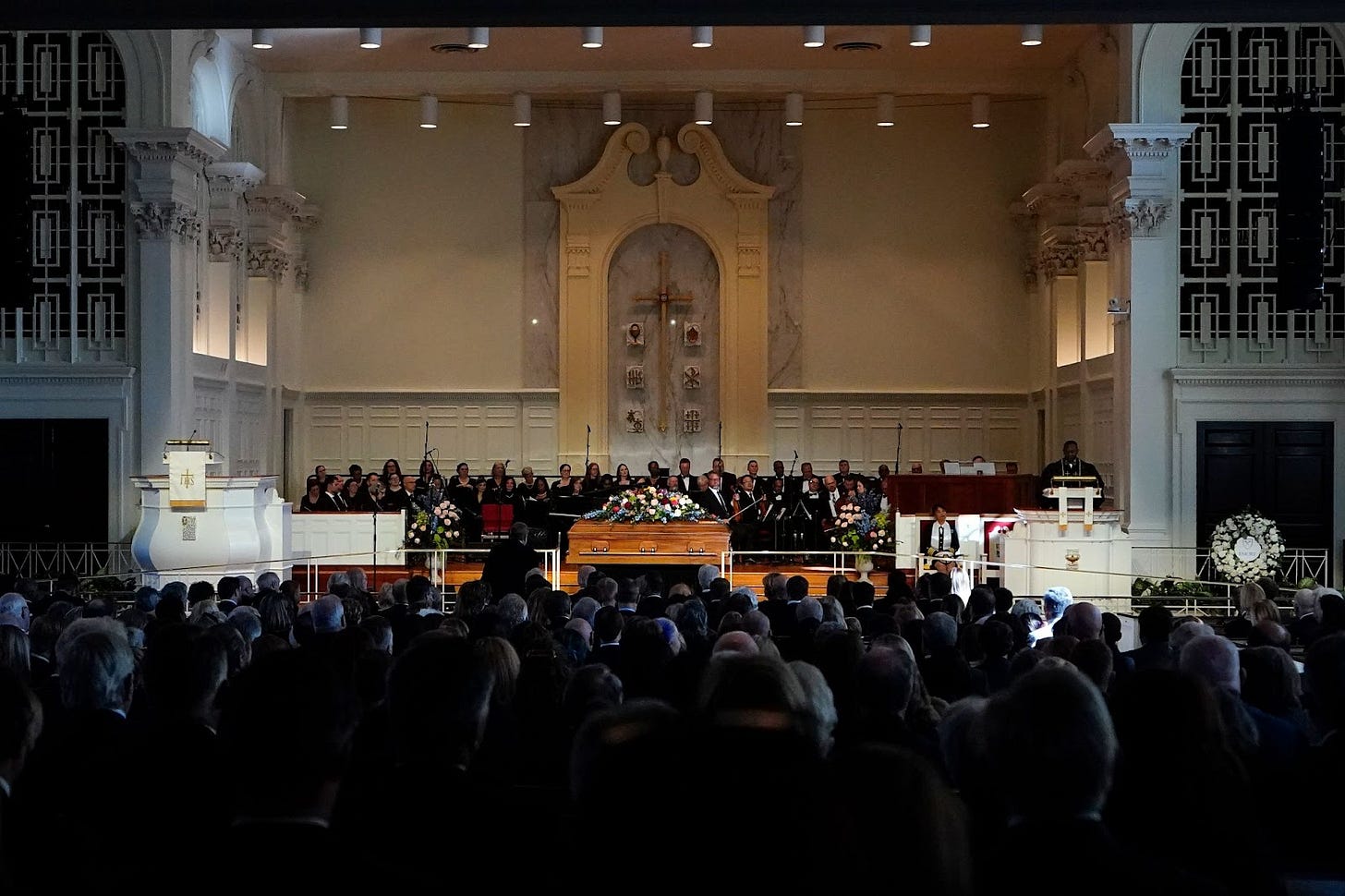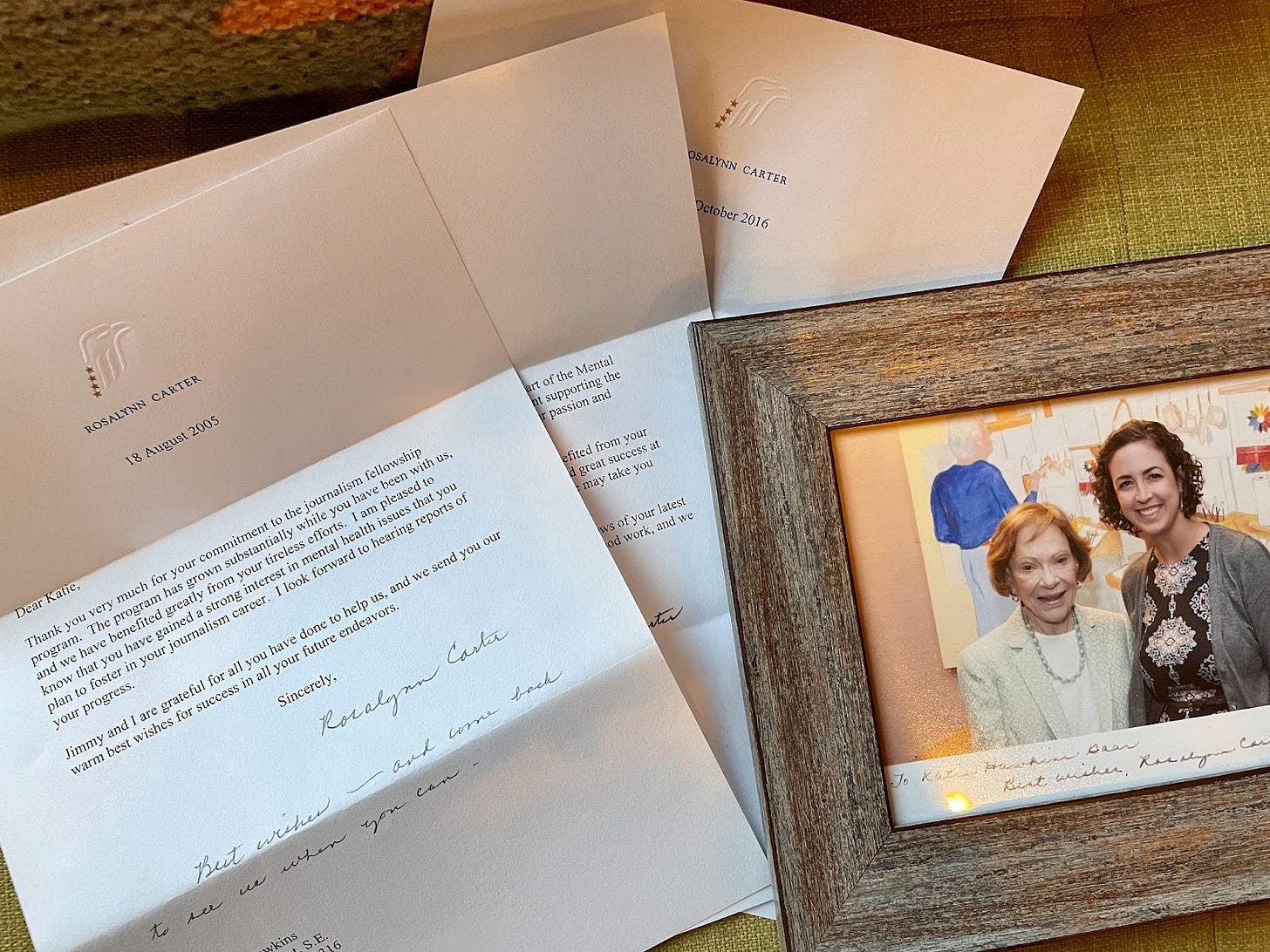Last week, I experienced one of the greatest honors of my life. I was among the invited attendees at Former First Lady Rosalynn Carter’s memorial service in Atlanta.
Just a few hundred people filled the sanctuary, some well-known — President Joe Biden and Dr. Jill Biden, Hillary and Bill Clinton, Laura Bush, Michelle Obama, and Melania Trump, for example — plus members of the Carter family, and the many others who knew Mrs. Carter through her work in support of mental health, the rights of caregivers, and even the protection of monarch butterflies.
I was connected with Mrs. Carter through my work with The Carter Center, the nonprofit organization she and Former President Jimmy Carter founded in 1982 to advance peace and health around the world. I returned to The Carter Center as a part-time contractor this year, two decades after I first stepped foot on its beautiful campus.
I began volunteering with The Carter Center’s Mental Health Program, specifically with the Rosalynn Carter Fellowships for Mental Health Journalism, in the summer of 2003, just after graduating from high school. Throughout college, I continued working with the fellowship program part-time, helping to sort through fellowship applications and connect journalists with mental health experts. Once I began my career in journalism, I kept in close touch with the program staff.
In 2016, not long after I became a faculty member at The Poynter Institute, I was invited to join the Rosalynn Carter fellowships advisory board — a meaningful, full-circle moment both professionally and personally. That invitation came in the form of a letter written and signed by Mrs. Carter herself, one of many from her I’ve kept to this day.
Over the years, I was lucky enough to have a handful of in-person exchanges with Mrs. Carter. I met with her as a newly minted college graduate, ready to take on the world. I’d presented at fellowship meetings a few times while she was in the crowd, sporting an encouraging smile. In 2018, a year after my husband died and a few years after the loss of her grandson, we sat next to each other at a luncheon and chatted about living with grief — how hard it was, and how it illuminated what was really important in life. That was the last time I saw her.
Despite our exchanges and my involvement with The Carter Center, I never expected to get an invitation to her memorial service. Last Tuesday, Billy and I sat in the sanctuary in disbelief — incredibly touched and honored to be among the few chosen to celebrate Mrs. Carter’s life in person.
I’ve been to a number of funerals and memorial services billed as “celebrations of life,” but that promise always falls a bit short. The sadness of the gathering swallows any glimmer of celebration. But Mrs. Carter’s service, while somber, was undoubtedly celebratory. For someone who lived 96 years and spent those years serving others, there was a lot to rejoice.
It was exciting to be in the room with so many dignitaries. It was a treat to hear performances by members of the Atlanta Symphony Orchestra, plus musicians like Trisha Yearwood and Garth Brooks. But the best part of Tuesday’s service, hands down, was learning more about Rosalynn Carter’s incredible life. The tributes, delivered by Mrs. Carter’s family and close friends, offered a wide-ranging glimpse of the person she was: someone who broke barriers by attending White House cabinet meetings and broke bread by making pimento cheese sandwiches for strangers on long airplane flights.
“What a remarkable woman she was — wife, mother, business manager, political strategist, diplomat, advocate, author,” recalled Kathy Cade, who worked with Mrs. Carter in the East Wing of the White House and for many decades since. “Yet what I remember most about her was her tireless dedication to taking care of others.”
Through a series of beautiful tributes, we all learned and remembered how much Mrs. Carter cared for others, especially the most destitute and disenfranchised.
After the service ended and we regular folks were finally allowed to leave, I ran into a colleague exiting her pew. “I don’t know what to do with the rest of my day!” she said, dabbing her eyes with a tissue. “I don’t know what to do with the rest of my life!” I replied, laughing.
Like so many jokes, there was a kernel of truth. Sitting there amongst that crowd, listening to story after story of her incredible life, I felt a growing sense of responsibility — to do more, to offer more, to love more, to appreciate more.
It’s said that funerals are for the living. They allow us to gather, to grieve, and to say goodbye. They also offer us a rare moment for deep reflection, a reminder of our own mortality and that the time we have isn’t a given. For me, a funeral also gives me a chance to adjust my own course. Like every ending, a funeral marks a beginning: an occasion to start anew, guided by the curated lessons from a loved one’s life.
Together, the tributes from Mrs. Carter’s memorial formed a blueprint for a life well lived: To rise up to the opportunities we are given, but to accept them humbly. To look for ways to help others, especially those less fortunate. To stay true to our roots and honor those who came before us. To extend a hand to those who come after us. And to spend time with the people we love most.
The person Rosalynn Carter loved most was Jimmy Carter, who was also in the crowd — his second public appearance since entering hospice care in February. At 99 years old and at the end of his life, President Carter appeared frail and gaunt. He seemed barely conscious, though his family said he insisted on attending his wife’s memorial services. His presence was a final act of love and devotion.
President and Mrs. Carter were married 77 years, the longest-lasting presidential couple in U.S. history. In the days and weeks after Mrs. Carter’s death, plenty of news outlets focused on their love — a beautiful story indeed. But Tuesday’s service taught me that Mrs. Carter’s entire life was a love story. She was always guided by love: a love for others, a love for service, a love for laughter, and a love for pushing the boundaries of what was possible.
Bearing witness to Mrs. Carter’s story makes me want to choose a life filled with and fueled by love. To push away shame and fear and embrace love instead. To laugh more easily, help more willingly, and love more deeply.
I can’t think of a better legacy than that.
xoxo KHG







A moving post and tribute, Katie. Thank you for sharing. Lives like Mrs Carter's are an inspiration to us. And are a reminder that it's possible to be in public life and be a decent person.
Thank you for this glowing personal tribute to an inspiring person, and a First Lady to keep in our memory.